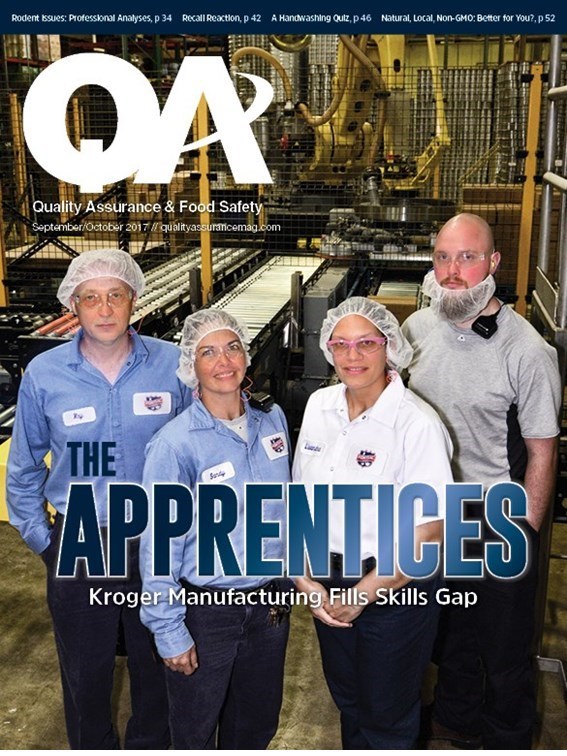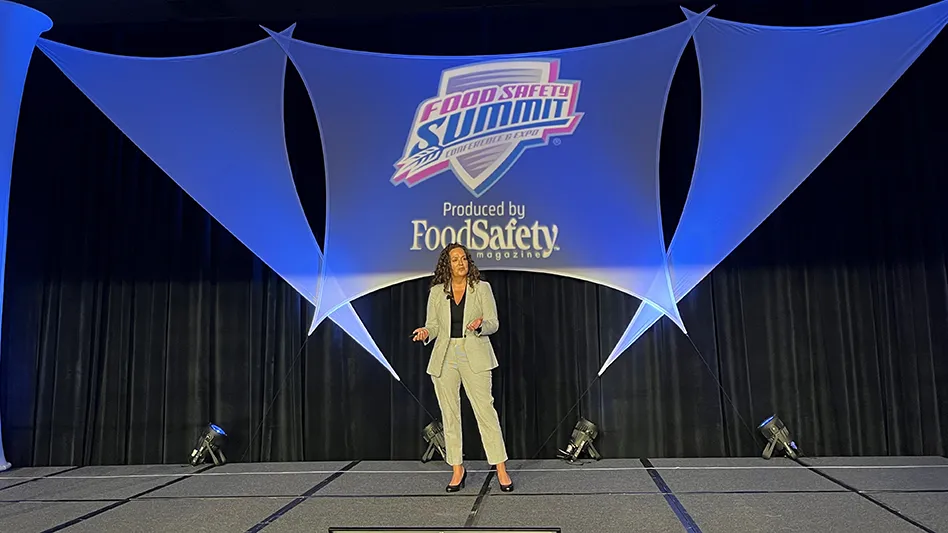
By Lisa Lupo
Filling positions in science, technology, engineering, and math (STEM) fields with qualified workers has become a global challenge impacting numerous industries, including that of food and beverage manufacturing. While a number of efforts are being initiated across the industry to address the issue (as discussed in Schooling for the Future, QA March/April 2017), the Kroger Manufacturing Division is leading a charge to fill the skills gap through its federally registered Apprenticeship Program.
It all started when Engineering, Maintenance, and Controls Supervisor Ray Gaites of the division’s Pontiac Foods plant in Elgin, S.C., was finding it difficult to get qualified electricians to work on the food processing equipment. So he suggested the plant begin an internship program. When the idea was forwarded to corporate human resources, the suggestion came back: “How about an apprenticeship?”
That conversation of 2010 eventually led to manufacturing-wide adoption of the initiative, with customized Registered Apprenticeship Programs at nearly all of Kroger’s 35 manufacturing facilities — and a goal of having a program at every location by the end of 2017, with at least 40 registered apprentices across the division.
“We had 35 plants crying out for help because they couldn’t find skilled labor; we had one plant that was 18 people down in maintenance,” said Stacey Rose, corporate brands and manufacturing human resources and labor relations senior manager. “So, we decided to start with the most painful points: highly skilled hourly maintenance mechanics and electricians.”

The Pontiac plant began with the electrical/electronic service operator (EESO) apprenticeship program because, as Gaites explained, “Recruiting experienced industrial electricians can be difficult and very time consuming,” because it is critical that vacancies are filled with qualified people. So, he said, “The apprenticeship program allows us to prepare for our future by cultivating talented individuals who can gradually and seamlessly transition into the fully qualified EESO slot.”
FOOD SAFETY & QUALITY. While the key focus of the program is that of electrical and electronic service and maintenance of the facility and its equipment, the program has significant impact on all operational aspects, including those of food safety and quality. “Any type of training has quality and safety as underlying factors,” said Site Leader John Bomba. “When you have people who are better at their skills, you have a better program, and you won’t have mishaps that can lead to foreign objects or contamination.”
The apprenticeship program focuses heavily on safety requirements, and participants learn about and become skilled in such aspects as the food-grade requirements of the equipment and line efficiency. This increases food quality and safety because, Bomba said, “If you have everything running well, it creates a safer environment for people and the same for food quality. When equipment goes down and you have to fix it, that’s when you have more exposure to contamination.”
It also is beneficial to have the expertise in-house, because employees have full knowledge of the equipment and operations in which it is run — and they have ownership in the results, Bomba said.
But it’s not an easy program. “I am very demanding,” Gaites said. “I have very high expectations. In this field, there are no second chances sometimes. I would hate if my lack of focus were to put someone in a compromising situation.”
A MANUFACTURING-WIDE PROGRAM. While many of Kroger Manufacturing’s apprenticeship programs focus on EESO, some facilities are implementing or developing other apprenticeships for positions such as lab technicians, industrial manufacturing technicians, roaster operators, and pasteurizers, as well as a corporate HR internship. Additionally, the HR intern, Tre’Von Howell, has been valuable in assisting the Pontiac plant with the rollout of a number of new positions and promotions, Rose said. “We’ve given all our plants the autonomy to design their own program within Department of Labor (DOL) apprenticeship requirements,” Rose said.

But, regardless of the field, “When we started looking at a registered apprenticeship program manufacturing-wide, we used the Pontiac plant, which had a functioning program, as a model, asking, ‘What has worked for you?’” Rose said.
All Kroger’s apprenticeship programs are registered with the DOL and work with local colleges and/or technical schools for applicable classes and accreditation. As explained by Bomba, a company working with the registered apprenticeship program hires or identifies a full-time employee for training to fit a company need, then constructs a four-year hands-on training and classroom experience. The employee’s wage can rise as training progresses in the program. At the end, the employee has a federally recognized credential certifying a broad-based level of training, adequate for hiring anywhere in the country.
Additionally, as one of the 230 DOL ApprenticshipUSA Leaders of Excellence in Apprenticeship, Development, Education, and Research (LEADERs), Kroger has committed to expanding apprenticeships across the U.S. and helping the program achieve its goal to “engage businesses and partners across all industries to discuss the value of apprenticeships and to encourage greater adoption of it as a workforce and talent development strategy.”
THE PONTIAC PROGRAM. “The program allows us to prepare for our future by grooming talented people,” Gaites said. The Pontiac Foods plant launched the program and hired its first apprentice, Sandra Simonds, in December 2011.
With Simonds now having completed the program, she works as an EESO. In the intervening year, the plant has added two additional EESO apprentices, Tim Moore, who is 6,000 hours into the 8,000-hour program, and Lisandra Diaz-Rivera who began her journey September 1, 2017.



While providing a federally registered career path, the Pontiac program also provides a significant wage progression, starting apprentices at an hourly wage of $14.55, with semi-annual increases over the four-year, 8,000-hour program as OJT and educational benchmarks are met. Upon completion, the employee’s income has increased to the hourly entry-level EESO wage of $23.03.
SANDY’S JOURNEY. Sandra Simonds was hired on December 5, 2011, as the facility’s — and Kroger Manufacturing’s — first EESO apprentice. Formerly an Army signal support system specialist, Simonds said, “I was in the military for four years; when I got out, I didn’t know what to do with my life, so I went to Savannah Technical College.” Deciding that she’d like to get into electrical engineering, Simonds got a job in residential and commercial wiring...then, in 2010, the housing market crashed and she was laid off. With the poor economy leaving her unemployed for over a year, she moved back home to South Carolina, where she saw Pontiac Foods’ ad on the web and immediately applied.
“She worked hard throughout the four-year program to learn and apply new skills and successfully completed it on December 5, 2015,” Gaites said. Five years later, Simonds is an integral part of the team on night shift, with the skills she learned as an apprentice and those she continues to learn every day having proven to be beneficial as she provides production and project support in addition to completing routine preventive maintenance tasks, he explained.
“The technical aspect of my job is so much different than in housing — that’s what I really like; it is challenging every day,” Simonds said. While she plans to continue her education to attain her electrical engineering degree, Simonds sees the fact that the apprenticeship program is federally recognized as being very important because of the opportunities it provides.
It was, in fact, Simonds who came up with the idea to tie the program in with a college to get it accredited, with courses counting toward a degree.
TIM’S JOURNEY. Pontiac’s second EESO apprentice, Tim Moore, was hired on July 7, 2014, as a production associate on night shift. “I saw the job opening at Pontiac and applied. Two to three weeks after I started, I found out about the apprenticeship program,” he said. Quickly realizing that line work was not his strength, “I was already looking to move up,” he said, so he asked one of the facility’s electricians about the program.
Even while Moore said he began begging Gaites for an opportunity, continually bugging him until he got the interview, Resource Leader Don Owczarczak said that he actually hired Moore with the intention that he would quickly move up. “We hired Tim to be a packer, stating, ‘You don’t belong as a packer, but we want you.’ So, we brought him into the plant knowing we would find a spot for him.”
“Even with no background in manufacturing or electrical, after interviewing him we were sure that he would be a good candidate for the program because of his determination and desire to succeed,” Gaites said, adding, “He has consistently met or exceeded expectations.” Not only has Moore completed 6,000 hours and all classes required for the industrial electrician certificate at Midlands Technical College, he has done it with an overall average grade of 92%.
“It has changed my life,” Moore said of the apprenticeship. “It has given me new skills and a lot higher earning potential.” Moore also plans to continue with his education to acquire a degree.
LISANDRA’S JOURNEY BEGINS. Prior to being selected as an apprentice, Lisandra Diaz-Rivera was in plant services. An electrician, who was impressed with her mechanical aptitude and work on the line, approached Gaites about interviewing her for an apprenticeship. While stating that he would like to develop a mechanical program at the plant, Gaites told her about the electrical program. “I thought it would be a wonderful idea,” Diaz-Rivera said. “It will help me grow professionally and learn about manufacturing, so I was very excited when I was selected.” Diaz-Rivera also works to improve her knowledge on her own by taking overtime hours on the lines. “When it’s available, I work the lines and learn how they run,” she said.
Along with Gaites and Pontiac Human Resources Manager Farisa McGowan, Simonds and Moore sit on the facility’s Apprenticeship Committee. The team provides ongoing assessment of the program, discusses issues, and suggests improvements.
LESSONS LEARNED AND ADVISED. While Pontiac Foods has retained the basis of its apprenticeship program, it has made changes throughout the years to improve the program and meet the continuing evolution of the industry. With the industry’s technological advances, some of the original classes are no longer relevant or are not offered by the partnering colleges, Gaites said. On the other hand, robotics has created a whole new area of training, and the plant has realized it needs to add more mechanical training.
“We’re still learning,” Gaites said. “Sandy (Simonds) had a harder time of it because of what we have learned since then.” For example, they now realize that the apprentices need more training in and a better understanding of the mechanical aspects of the equipment. “But we aren’t stopping her training even though she’s finished the program,” he said.
Facilities that would like to develop apprenticeship programs of their own, Gaites said, “need to do due diligence in rolling it out. Think about the entire process and what you want as an end result.”However, Bomba added, “it has to remain flexible once you start; you need to continue to discuss it and make improvements.”
For workers interested in participating in an apprentice program, Rose said, “It’s ideal for those who want to challenge themselves, as it’s constant learning. If you want to learn a trade that will last you a lifetime, it’s perfect.”
Rose is so passionate about the apprenticeship program — and its industry-wide expansion — that she regularly speaks at conferences about the initiative to spread the word and bring new workers into industry STEM positions.
“There is a complete skills gap in the industry, and we can’t just keep stealing from each other,” she said. “We need to create our own skilled labor force; it’s part of bringing skills back to America.”
The author is Editor of QA magazine. She can be reached at llupo@gie.net.

Explore the October 2017 Issue
Check out more from this issue and find you next story to read.
Latest from Quality Assurance & Food Safety
- FDA Issues Update on Post-Market Assessment of Tara Flour
- ASI Announces Training Partnership with Rootwurks
- Nfinite Nanotech Closes $6.5 Million Seed Financing to Create Flexible Food Packaging with Nanotechnology
- University of Pretoria Food Science Student Wins IFT and PepsiCo’s Academic and Travel Undergraduate Hybrid Scholarship
- Kraft Natural Cheese and Shawn Johnson East Celebrate Launch of Kraft Signature Shreds
- Natural Sourcing International Announces Voluntary Recall of Black Chia Seeds
- PTNPA's DC Fly-In Connects Members with Policymakers
- Breck Partners Acquires NPX One





